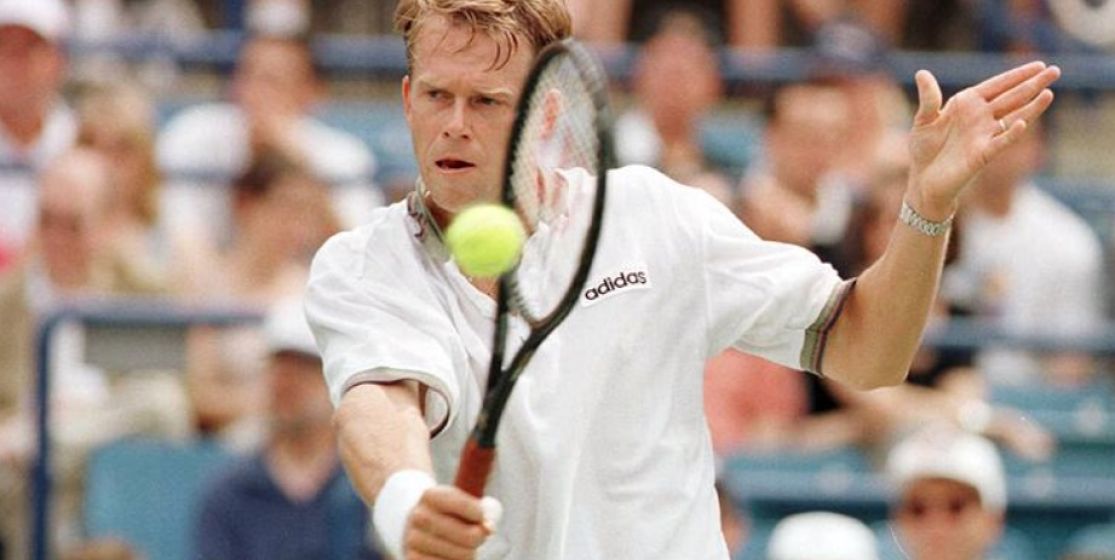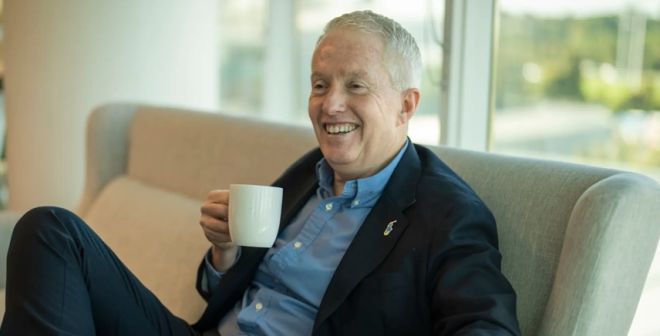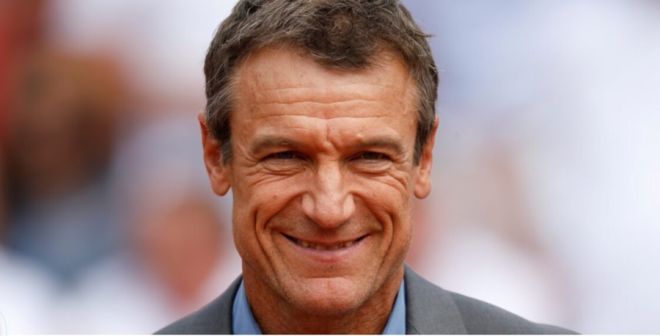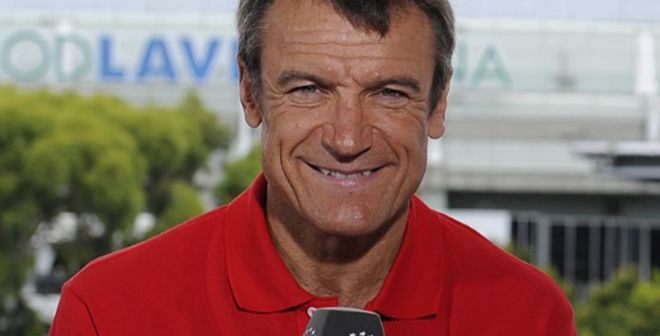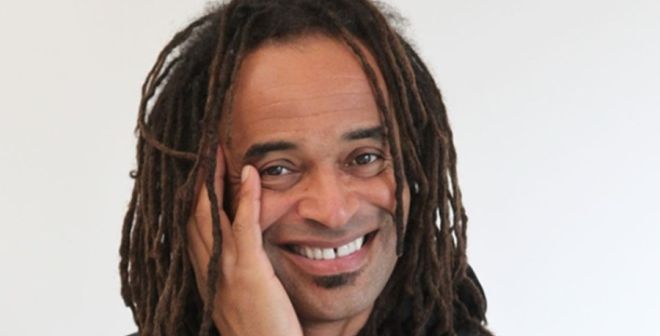Q. Stefan Edberg, thanks so much for your time. Your life, I hate to say, was pretty low key. Would you say that that's accurate? And did you prefer it that way?
STEFAN EDBERG: It is accurate, and I did prefer it that way. In many ways, it was lucky, because after Bjorn Borg, there was sort of a group of players, Mats could take off some pressure, obviously being in the same level as I was, and there was a lot of other Swedes, so we were more treated as a group. That suited me quite well, actually.
Q. Do you tend to miss some of the limelight from the past?
STEFAN EDBERG: No, I don't miss a lot, to be honest (smiling). Yeah, maybe there are certain things, you know, being out on the center court at these crucial moments with the crowds, and like I said, at Wimbledon, you know, when you get to match points and it's totally quiet and you can hardly hear a sound, maybe somebody shouting out, those moments are very special. Maybe, you know, spending time with the guys in the locker rooms. Those are the times that I do miss a little bit, but overall, you know, you have to get on in life and do something else.
But it's great to be around tennis, I would say. So even if I'm not very connected to tennis, it's still great to go to the big tournaments to see some of the new generation guys and see some of the players that you played with in the past and just feel the environment, see the improvements, which has been quite incredible in most places (smiling).
Q. How do you think, when you talk about the improvements of this generation, how do you think you would have come up against them?
STEFAN EDBERG: Well, it would have been a huge challenge. I have said that before. You know, with time, it changes a lot, and obviously they are playing at a much higher level than what we did.
But, you know, different knowledge today, different technology, things have improved. So it's quite impressive what they do and how they play today. I think the big turning point was probably, you know, shortly after I stopped when Roger came into the scene with Rafa and Djokovic. They sort of took it to another level.
Now the young guys have sort of finally reached, after they have dominated for 10, 15 years, which has been incredible, and I have said to a lot of people, we are not going to see this for the next 50 to 100 years to have three players dominating as much as they did. It's highly unlikely, almost impossible.
It's been great for tennis, but pretty exciting with the new generation, too, because I thought there'd be a little bit of a challenge, when they do retired, Roger first, now Rafa is on his way, and Djokovic we don't know yet, but with the new generation, they are creating a lot of interest and it's good to see.
Q. You talk about that era of Roger, Rafa, and Novak, and you can't deny how amazing it has been, but I think people forget about that era you were in. Becker, you, Wilander, Lendl.
STEFAN EDBERG: Yeah. Uh huh. Yeah, McEnroe. Yeah, there was almost like three generations playing at the same time. You know, the one dominating the past, the ones dominating now, and the one challenging the one dominating at the time.
So it was pretty exciting. I think I was very lucky to get in tennis in the mid '80s, but tennis was just exploding everywhere. Prize money was going up and interest was going up.
And then obviously, you know, when Boris Becker won Wimbledon, that took it to another level with interest, as well, I would say, because he came out of nowhere and it got super exciting. I was part of that era.
Then Agassi and Sampras came there and took over and created a lot of interest from the American side. And Courier, obviously, Chang. So there were a lot of personalities out there and many, many players, so it was not quite for sure who was going to win. It's been quite predictable for some time. So, in that respect, it's a bit different.
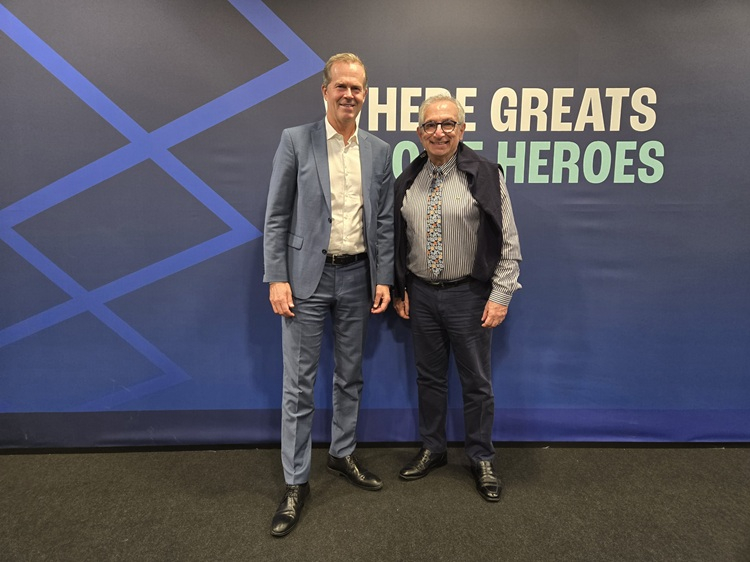
Q. You mentioned Roger before. How much did you enjoy your time as that guy's coach?
STEFAN EDBERG: (Smiling.) First of all, I said to many people, I never thought or never saw myself being a coach, going back on the tour.
Yes, making that decision was a little bit of a challenge, because it does change your life, because being at home and not being in the limelight, suddenly, you know, you're going back on the tour, going to spend 100 plus days, you're going to be around the best player in the world or one of the best players in the world.
But it was quite exciting. I think the only way that I could do it was being part of a team with Severin sort of being the head coach, I'm being sort of more like a helping coach and bringing some different ideas in.
It was really good to be around for those two years and to go back to many places I haven't been for two decades and see the improvements, and also to see close by how the guys are training today, the time they put in, and the new generations. It was a good time.
Q. As long as I have known you, you haven't changed. The personality side of you has never changed. Calm, grounded, and all that. Was it difficult to maintain that?
STEFAN EDBERG: (Laughter.) No, naturally I think I'm pretty calm. You know, I never tried to really play anybody else. That makes life a lot easier when you don't have to play a role, just being yourself.
And obviously there are things that you have to work on, because, you know, going back when I was young, you know, I was sort of I can't find the English word hanging with my head, was quite hard on myself.
Q. Down?
STEFAN EDBERG: Yeah, down, criticizing myself for no reason. Yeah, there were some changes, some necessary changes, maybe more from the mental part that needed to change in order for me to improve and get to the No. 1 in the world.
So, it was progress. But, you know, I've stayed pretty much the same in many ways, I think, but, you know, the tennis life, being in the limelight, having to handle all these people, big stages, it does change you, no question about it. Some people change more than others. I probably haven't changed a lot. At least that's what people tell me, but...
Q. For I think it's 30 plus years you have been married to Annette? What makes it work?
STEFAN EDBERG: Yes. We just connect very well. In any relationships, you know, it's with trust and, you know, spending time together. If there are some issues, you have to solve them as soon as possible.
So, it has worked out very well, which it doesn't always do for a lot of people. So we're probably stronger than ever.
Q. And Emilie and Christopher, your children, they never really got into tennis, did they? Would you have liked them to, or, I mean, you have to be more than proud and happy of your two children.
STEFAN EDBERG: Absolutely. I mean, I think when you do have kids, I think the most important thing with kids, I believe, is to get them interested in something. I think sports is a great way of getting, you know, your kids into. Could be anything else.
Tennis was never a priority. Tennis was just a priority to learn sort of the basic skills of tennis, which Emilie did. Christopher, he continued playing until he was 16, and then he sort of stopped playing. Emilie went into figure skating, which is quite a sport, which you never knew anything about before, but it was very impressive what they did at a young age.
It's an educational thing which takes you into life. And being in sports means you have the responsibility. You need to have your goals, and I think you have some advantages going into the real life doing work at the office or whatever you do if you have done sports. So doing sports and having activities was the priority. But not tennis.
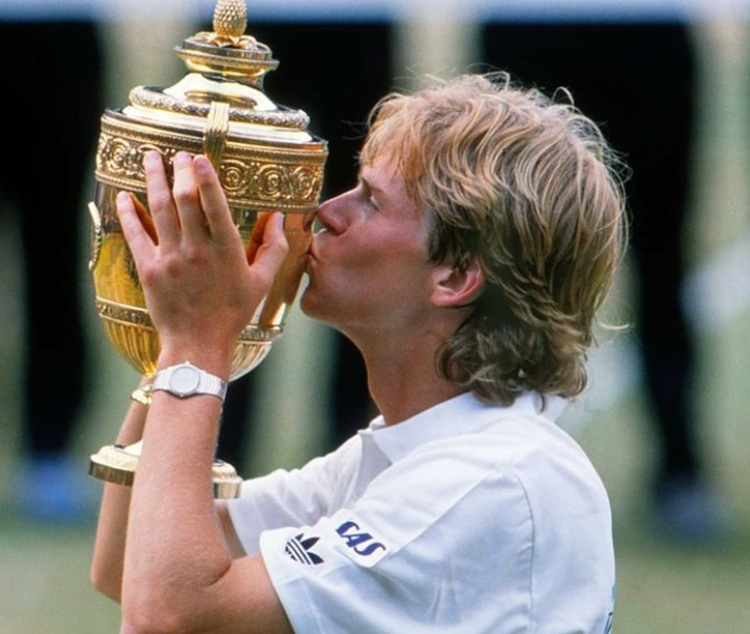
Q. Fair enough. For you, Stefan, what occupies most of your time now? What's a typical day like for you?
STEFAN EDBERG: Oh, good question. I would say let's put it this way: We have the luxury to do basically what we would like to do. We come sort of to the conclusions life is now and do the things that you want to do, and we have the luxury of doing it.
We do spend time traveling quite a bit, and, you know, we do things. I work basically every day one way or another. I can decide whether I want to work 12 hours, 18 hours, or 1 hour. So basically do a couple of works every day.
I'm more into the financial market and try to keep up with that. That's a full time job if you want it. And I have property back in Sweden which I overlook. I have a foundation in tennis back in Sweden which I overlook.
But I'm pretty free today to do whatever I want to do. I still would like to travel and watch Wimbledon when you can, going to Paris. Haven't been to Australia for a long time but thinking about it (smiling).
Q. Good.
STEFAN EDBERG: So life is good. But I don't play golf, for instance, but I do a lot of walks and, you know, try to see things and spend time with the kids and family, of course, and seeing friends. So, it's good as of now.
Q. Are you spending the most time in London, Portugal, Sweden?
STEFAN EDBERG: I still spend most of the time in Sweden. We spend quite a bit of time in Portugal. We spend a lot of time in Europe. We love going around Europe because there are so many things to see.
We've just been in Italy, one example where you can spend a few years just touring around to see and eat well. So yeah, that's what we try to do. But we stay in Europe most of the time.
Q. You just mentioned Australia. I think you always loved playing down there. What do you miss, if you do miss anything, from there? Vegemite?
STEFAN EDBERG: Vegemite I don't miss at all (smiling). I really don't. What I think the most fascinating or what I really liked about Australia is because you did finish your year here in Europe where you have the winter and it's dark, and coming to Australia, January, it's the beginning of the year, you come to the summer, you start a new year. Everybody is fresh, and you've got so many things to look forward to.
Plus I really enjoyed, you know, the Australian people, mentality, a lot more laid back, casual. It was a good setup, especially once they built Flinders Park with the access for the players.
It was just a good setup, and for some reason, I usually played well in Australia.
Q. Yeah.
STEFAN EDBERG: And you usually like places where you play well, as well. You should never forget that. (Laughter.)
Q. Percy Rosberg was your first coach. And then Tony Pickard came along. With Tony, was he really like a second father figure for you? I mean, almost tied at the hip.
STEFAN EDBERG: Yes. Very much so. He was like a second father to me when you look back, you know, someone that was of big importance getting into my life at the time and obviously, you know, working on getting my head up. He had knowledge, you know, playing Davis Cup himself, playing on the tour at that time.
I think it was a good match, because he was sort of the strong guy. You know, he could take my could say no and step in when needed to. So he had a little bit of a father role, which suited me quite well.
Q. What would you feel is your greatest victory, the victory that probably means the most to you?
STEFAN EDBERG: When I look back now, you have to look at a few different things, because it all goes in stages. I always say winning Donald Duck Cup at 11, that was the big start of it. That was the biggest tournament. I came in unseeded. Nobody knew about me. That was sort of the start of getting the huge interest in tennis.
Q. Where was the Donald Duck Cup?
STEFAN EDBERG: In Bastad. It was a huge tournament in the '70s, not many people, because you start at your region and then your district. And it was about 12,000 people enter the tournament. So, it was obviously a huge thing at the time.
The funny thing, in 1977, I won it under 11, and Mats Wilander won it under 13, so that picture we have seen quite a lot of times. In Bastad, 1970s, two No. 1s playing in the same level of local junior tournament.
So that was really sort of where it took off. I think then winning the European Championships at 14, huge step. Getting on the tour was the next step. Then winning in Milan, '84, the first ATP, that was sort of a huge thing.
Had quite a setback after that. Didn't play very well for some time. Then obviously when you're in there, you try to win your first Grand Slam was in '85, playing against Mats in the final. But a special thing winning Wimbledon first time, it means a lot because of the history. It's about the only tournament you can watch on Swedish television. With Borg winning five titles, that sort of the thing I would say.
But if you talk about the most impressive win was US Open '92.
I played Courier in '91 in the final. I played Sampras in '92. But what a lot of people don't remember is on Monday I played against Krajicek, down 3 1 in the fifth set, came back to win that match.
Played Lendl quarterfinal on Wednesday. We had to finish at midnight. We came back on Thursday. Down 4 2 in the fifth set. Managed to win that match. Then I played Michael Chang on Saturday. This was the day before the final. We played 5 hours, 26 minutes. And I was down 3 1 in the fifth set. I managed to win that match. Then I had to come back and play Sampras in the final the next day.
My God, that morning I was so sore. Can you imagine playing 5 hours, 26, and then to beat Sampras in the final, that's the biggest achievement, probably one of the bigger achievements, if you look back, and the amount of time spending on the court and being down and out basically three matches in a row.
So now I realize that probably was the best effort of my career. But it was also the last Grand Slam that I won.
Q. You kill me that you're remembering exact pinpoint stuff 30 years ago.
STEFAN EDBERG: Yeah, that one I do remember (smiling). Yes, I do, yeah, because it was a special one, it really was, in many ways. But at the same time, we talked about getting to No. 1, it's something very, very special that very few people do, something that you can tell the kids. So that is a very, very special thing to have been there and to get there and stay there for a little while.
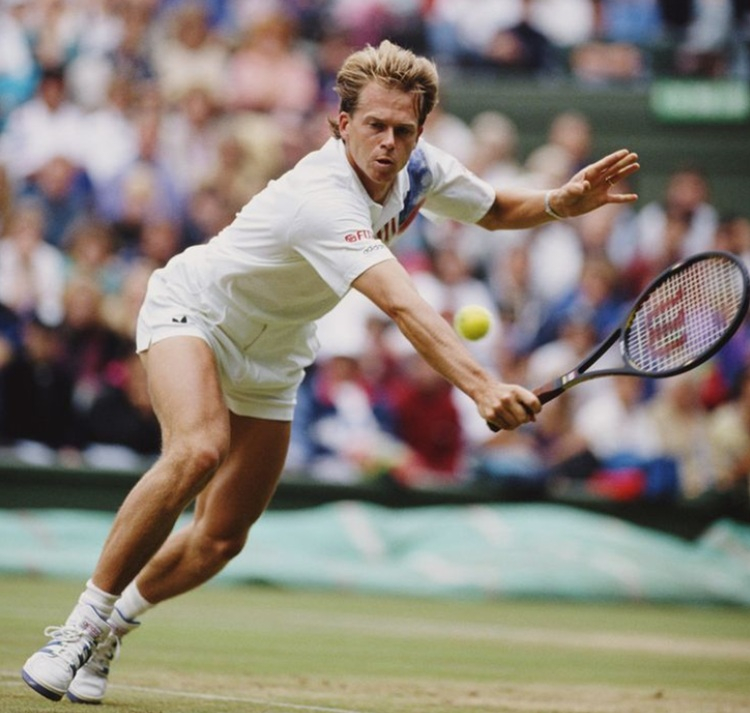
Q. On the other side of it, what would be your most disappointing or heartbreaking result?
STEFAN EDBERG: Well, it comes back to Paris, '89, Chang final, being reminded a lot of times. You know, it was so close. It was maybe one or two points, because I had, like, 10 breakpoints in the fourth.
And I still remember the backhand that I had, and I don't know what it was, 3 All, something, I had so much time. Am I going to go crosscourt, am I going to go down the line. Crosscourt I didn't have to hit it that well, that would have worked, but I went down the line and I missed it by a couple of centimeters, because that would have given me the break and more than likely win that title.
But I thought I would get another chance to win there, but I never really did. So that was disappointing afterwards a few years down the road. It wasn't so disappointing at the time.
But that would have been nice to have won that once, but I really only had one chance. It wasn't my surface, anyway. That was a tough one.
When you look back at the career, obviously there are things that you probably would have done a little bit different. When you think back now, especially towards the last couple of years, you probably would have changed the racquet, probably would have done a lot of things. Maybe changing the way you train, your matchup, maybe would have prolonged my career.
I think what did really shorten my career is, because I played, was it six Davis Cup finals in a row. That means in January you're starting and you finished in December.
Q. A couple weeks later you're starting again …
STEFAN EDBERG: Yeah. So, I actually played six seasons in a row without break. I'm 100% certain that shortened my career by about three, four years. Not physically but probably mentally. So, when people talk about long season, that was a long season (smiling).
Q. And then you fast forward to recent years, and what do you think is the issue with Swedish tennis and why it's fallen away in such a way and hasn't come back?
STEFAN EDBERG: Well, do you have 45 minutes, or... (Laughter.) No, well, it's a question that you do get asked quite a bit. I think if you go back to our generation, I think we grew up under exceptional circumstances. I think we had a Bjorn Borg effect. At the time in Sweden, we did all the things right without knowing it.
We probably took, you know, the training methods to different level. That's why we were successful. And then for a number of years, everybody had been looking at what Sweden did in the '80s, '90s, but obviously we have lost track, there is no question about it, and we are in a totally different situation as of now. I think it's going to take some time before we get back somewhere close that we were in the past.
I think that there are things being done, I know that, but I think you have to go back to the basics, starting at the very young age. I think they are doing that now, so it still might take quite some time before you see the results.
Q. Do you think it's possible that it could turn around?
STEFAN EDBERG: It can turn around, because we are at the very low level. You know, it's going to get better from here, but how good it's going to get going forward, it's hard to tell.
I think the situation that makes it a bit more difficult is we are very far up in the north. In order to succeed today, I think you need to be in Europe, Central Europe, in order to compete with other countries. So that's difficult at a young age.
Second thing is you need resources. Swedish Federation has been or is still a very poor federation. The clubs doesn't have much money. So, it's an issue with money, as well, because in order to sort of make it on the tour, you need a substantial amount of money each year just to be out there for two, three years, because, you know, it's not going to happen overnight. So that's an issue, as well. So it's far harder than it used to be. Not easy.
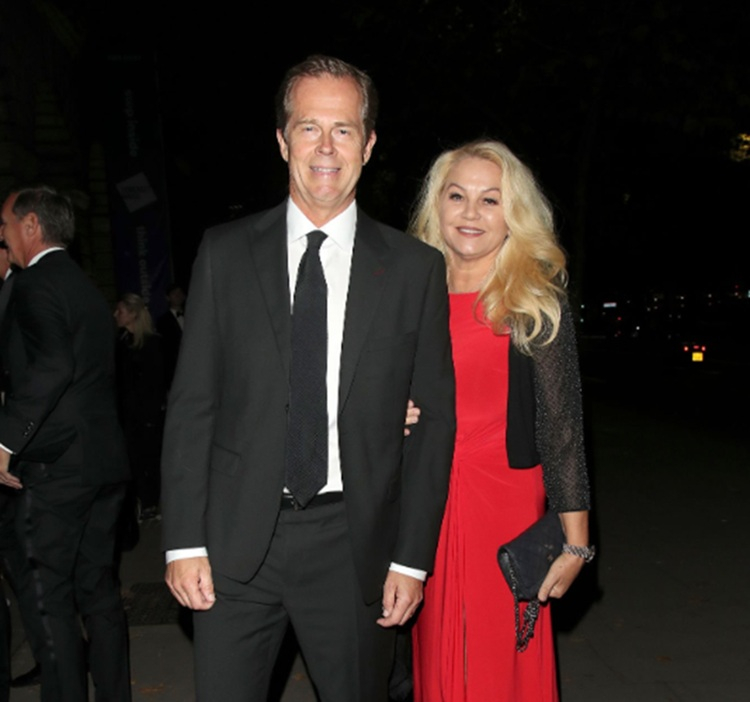
Q. For somebody like you, it would make you pretty sad and disappointed that the generation after you hasn't made any sort of mark on the tour?
STEFAN EDBERG: Well, obviously it's disappointing. I mean, we had a great deal of success going back from Borg and in the '60s, and obviously the last sort of superstar we had was Robin Soderling and that's quite some time ago here.
But, you know, you still have to be hopeful that one day we'll get back there. Not to the extent as it was previously, but, you know, at some point I'm sure we get some young kids, women, girls or boys at around the same age, doing the right thing with good backup and becomes competitive.
Q. About Boris (Becker), he was your greatest rival. Did you make any contact with him (with what he went through) or how is the association these days?
STEFAN EDBERG: Well, Boris, I haven't spoken to him. I did not contact him at the time. We never really have been that close, but at the same time, we are close because we had gone through so much. We have so much history.
So, it's always so pleasant to meet him. I haven't met him for some time, but every time we meet, it's always on great terms and if he's good to talk about the history, what we achieved, what he has achieved.
But I'm so glad he sort of came through what he has, because I cannot even imagine how hard it would have been for him. Hopefully he'll be okay going forward here, and hopefully he got his life sorted out.
Q. You were just talking about you thought maybe that mental aspect, being mentally fried, cut your career to some degree. Do you think also that you were the all around nice guy and your personality, the sportsmanship that you always showed … maybe lost you some matches, some finals?
STEFAN EDBERG: Well, if it did, I don't mind (smiling). I really don't. I think it's very hard to tell. You know, I think it's important being fair on and off court. That's more important at the end of the road. I was successful. Looking back, probably could have been more successful, but who knows? I have no idea, to be honest.
Q. There were so many trophies, so many majors for your cabinet. I always love to ask champions this. Where do you keep your trophies and the ones that really mean something more or extra special?
STEFAN EDBERG: Well, I don't know if it's gonna be different from any others, but my two Wimbledon trophies, one is in Newport and one in Bastad at the museum. So I don't have one at home. And all the other trophies are down in the basement. I don't have one trophy in my apartment. That's quite unusual. I never put them back, because once I moved from London, I had a good cabinet for Wimbledon trophy, but I moved back to Sweden. Since then they have been in boxes.
I think it was loaned out to my hometown Vastervik for ten years at the display, but I packed them in boxes. I put the boxes back in the basement. So, there you go. It's pretty simple (smiling).
More information about
Players
 Tennis Legends
Tennis Legends

Andre AGASSI

Mats WILANDER

Boris BECKER

Pete SAMPRAS

John McENROE

Ivan LENDL

Stefan EDBERG

Jim COURIER


